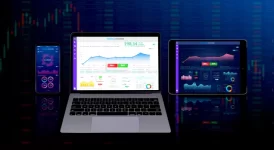
Retail Forex Trading Platforms: A Comprehensive Guide
In today’s digital age, retail forex trading has become increasingly popular among individual investors. Forex trading platforms offer retail traders the ability to participate in the global foreign exchange market, providing opportunities to make profits by buying and selling currencies. In this comprehensive guide, we will discuss everything you need to know about retail forex trading platforms.
Table of Contents
- Introduction
- What is a Retail Forex Trading Platform?
- Types of Retail Forex Trading Platforms
- Web-Based Trading Platforms
- Desktop Trading Platforms
- Mobile Trading Platforms
- Features of Retail Forex Trading Platforms
- Real-Time Data and Quotes
- Order Execution
- Charting and Analysis Tools
- Customizable Interface
- Trading Signals and Indicators
- Risk Management Tools
- Choosing the Right Retail Forex Trading Platform
- Security and Regulation
- Fees and Commissions
- Trading Instruments and Markets
- User-Friendliness and Customization
- Advantages of Retail Forex Trading Platforms
- Accessibility and Convenience
- High Liquidity
- Lower Costs and Fees
- Flexibility and Control
- Risks of Retail Forex Trading Platforms
- Market Risk
- Leverage Risk
- Counterparty Risk
- Best Practices for Using Retail Forex Trading Platforms
- Education and Research
- Practice with a Demo Account
- Develop a Trading Plan
- Use Risk Management Strategies
- Conclusion
- FAQs
1. Introduction
Forex trading is the buying and selling of currencies on the foreign exchange market. The market is the largest financial market in the world, with an average daily trading volume of over $6 trillion. In the past, forex trading was only accessible to large financial institutions and corporations. However, with the advent of retail forex trading platforms, individual investors can now participate in the market and trade currencies from the comfort of their own homes.
2. What is a Retail Forex Trading Platform?
A retail forex trading platform is an online software application that allows individual investors to access the forex market and trade currencies. The platform provides traders with real-time market data and quotes, order execution, charting and analysis tools, and other features that help them make informed trading decisions.
3. Types of Retail Forex Trading Platforms
There are three types of retail forex trading platforms: web-based trading platforms, desktop trading platforms, and mobile trading platforms.
Web-Based Trading Platforms
Web-based trading platforms are accessed through a web browser and require no software download or installation. They are convenient and easy to use, as traders can access their trading account from any computer with an internet connection.
Desktop Trading Platforms
Desktop trading platforms are software applications that are downloaded and installed on a trader’s computer. They offer more advanced features and customization options than web-based platforms, but require a higher level of technical expertise to use.
Mobile Trading Platforms
Mobile trading platforms are applications that can be downloaded and installed on a trader’s smartphone or tablet. They offer traders the ability to monitor their trades and execute orders on-the-go.
4. Features of Retail Forex Trading Platforms
Retail forex trading platforms offer a wide range of features that help traders make informed trading decisions. Some of the key features include:
Real-Time Data and Quotes
Forex trading platforms provide traders with real-time market data and quotes, allowing them to monitor currency prices and identify trading opportunities.
Order Execution
Trading platforms allow traders to place and execute orders quickly and efficiently. They also provide a range of order types, such as limit orders and stop-loss orders, to help traders manage their positions.
Charting and Analysis Tools
Forex trading platforms provide traders with a variety of charting and analysis tools to help them make informed trading decisions. These tools include technical indicators, such as moving averages and Bollinger Bands, as well as charting features, such as trend lines and chart patterns.
Customizable Interface
Most forex trading platforms offer a customizable interface that allows traders to personalize the platform to their specific trading needs. This includes the ability to add or remove features, change color schemes, and adjust the layout of the platform.
Trading Signals and Indicators
Some forex trading platforms offer trading signals and indicators that can help traders identify potential trading opportunities. These signals and indicators are based on technical analysis and can provide traders with valuable insights into market trends and conditions.
Risk Management Tools
Forex trading platforms also provide traders with a range of risk management tools, such as stop-loss orders and trailing stops, to help them manage their positions and limit potential losses.
5. Choosing the Right Retail Forex Trading Platform
When choosing a retail forex trading platform, there are several factors to consider:
Security and Regulation
It is important to choose a platform that is secure and regulated by a reputable financial authority. This helps to ensure that your funds are safe and that the platform operates in a transparent and fair manner.
Fees and Commissions
Different platforms charge different fees and commissions, so it is important to consider these costs when choosing a platform. Look for a platform that offers competitive fees and transparent pricing.
Trading Instruments and Markets
Not all forex trading platforms offer the same trading instruments and markets. Make sure the platform you choose offers the currency pairs and markets that you are interested in trading.
User-Friendliness and Customization
Choose a platform that is easy to use and customize to your specific trading needs. Look for a platform that offers a user-friendly interface and a range of customization options.
6. Advantages of Retail Forex Trading Platforms
There are several advantages to using retail forex trading platforms:
Accessibility and Convenience
Forex trading platforms allow traders to access the market from anywhere with an internet connection. This provides greater flexibility and convenience than traditional trading methods.
High Liquidity
The forex market is the most liquid financial market in the world, providing traders with ample opportunities to enter and exit trades quickly and efficiently.
Lower Costs and Fees
Forex trading platforms offer lower costs and fees than traditional trading methods, such as stocks and commodities. This allows traders to keep more of their profits.
Flexibility and Control
Forex trading platforms offer traders greater flexibility and control over their trades, allowing them to customize their positions and manage their risks more effectively.
7. Risks of Retail Forex Trading Platforms
While retail forex trading platforms offer many advantages, there are also several risks to consider:
Market Risk
The forex market is volatile and can be subject to sudden and unexpected movements. This can lead to significant losses if traders are not prepared.
Leverage Risk
Forex trading platforms allow traders to use leverage to increase their buying power. While this can amplify profits, it can also lead to larger losses if trades go against you.
Counterparty Risk
Forex trading platforms rely on third-party brokers to execute trades. There is a risk that these brokers may not operate in a transparent or fair manner, which can lead to losses for traders.
8. Best Practices for Using Retail Forex Trading Platforms
To maximize the benefits of retail forex trading platforms, it is important to follow these best practices:
Education and Research
Before trading on a forex platform, it is important to educate yourself on the market and the trading platform itself. Conduct thorough research and practice with a demo account before trading with real money.
Practice with a Demo Account
Most forex trading platforms offer demo accounts that allow traders to practice trading with virtual money. This is a great way to test out different trading strategies and get a feel for the platform before trading with real money.
Develop a Trading Plan
Before trading on a forex platform, it is important to develop a trading plan that outlines your goals, risk tolerance, and trading strategy. Stick to your plan and avoid impulsive trades.
Use Risk Management Strategies
Forex trading platforms offer a range of risk management tools, such as stop-loss orders and trailing stops, to help traders manage their positions and limit potential losses. Use these tools to protect your capital.
9. Conclusion
Retail forex trading platforms offer individual investors the opportunity to participate in the global foreign exchange market and potentially make profits through currency trading. These platforms offer a range of features and benefits, including accessibility, high liquidity, lower costs and fees, and flexibility and control. However, it is important to consider the risks and follow best practices to maximize your chances of success.
10. FAQs
- What is a forex trading platform? A forex trading platform is an online software application that allows individual investors to access the forex market and trade currencies.
- What are the different types of forex trading platforms? There are three types of forex trading platforms: web-based trading platforms, desktop trading platforms, and mobile trading platforms.
- What features do forex trading platforms offer? Forex trading platforms offer a range of features, including real-time data and quotes, order execution, charting and analysis tools, customizable interfaces, trading signals and indicators, and risk management tools.
- What factors should I consider when choosing a forex trading platform? When choosing a forex trading platform, consider factors such as security and regulation, fees and commissions, trading instruments and markets, and user-friendliness and customization.
- What are the risks of using a forex trading platform? The risks of using a forex trading platform include market risk, leverage risk, and counterparty risk.
- What are some best practices for using a forex trading platform? To maximize the benefits of using a forex trading platform, practice with a demo account, develop a trading plan, and use risk management strategies.
- Is it necessary to have experience to use a forex trading platform? No, it is not necessary to have prior trading experience to use a forex trading platform. However, it is important to educate yourself on the market and the platform before trading with real money.
- How do I know if a forex trading platform is secure? Look for a platform that is regulated by a reputable financial authority and offers security features such as encryption and two-factor authentication.
- Can I trade on a forex platform from my smartphone? Yes, many forex trading platforms offer mobile trading applications that allow traders to monitor and execute trades from their smartphones or tablets.
- How much money do I need to start trading on a forex platform? The amount of money needed to start trading on a forex platform varies depending on the platform and the trading strategy. Some platforms require a minimum deposit of a few hundred dollars, while others may require thousands of dollars. It is important to only trade with money that you can afford to lose.






